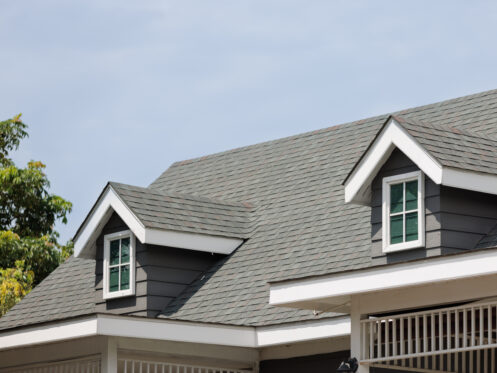You may feel tempted to skip yearly inspections if you had a professional install your roof within the last year or two. Asphalt roofs usually have a lifespan of about 20 years. Alternatively, metal, tile, and slate roofs can last between 30 and 50 years. However, regular maintenance is essential if you want your roof to last as long as estimated.
The Federal Emergency Management Agency (FEMA) suggests regular inspections are crucial for identifying and addressing minor issues before they escalate into major problems, no matter the age of your roof. These inspections are essential to identify damage from severe weather or flaws in your roof that only become apparent over time. An annual inspection is critical regardless of your roof’s age to ensure its durability and performance.
What Does a Roof Inspection Entail?
When a professional roofer arrives at a homeowner’s property, the inspection process begins with a thorough visual assessment of the entire roof. They will carefully examine the roof’s surface, looking for any visible signs of damage, wear, or potential issues. Their inspection includes checking for missing, cracked, or curling shingles, which can be early indicators of more significant problems.
The roofer will also examine the flashing around chimneys, vents, and other roof penetrations to ensure they are intact and properly sealed, preventing potential water leaks. Next, the roofer will climb onto the roof for a more detailed inspection. They will look for signs of granule loss on the shingles because they are essential for protecting the shingles from UV rays and harsh weather conditions.
Additionally, during a roof inspection, a professional will carefully examine your roof’s drainage system, including gutters and downspouts, to ensure they function correctly. Blocked or poorly aligned gutters can lead to water pooling on the roof, which can seep into your home and cause interior damage. Alternatively, downspouts should be securely attached and effectively divert water away from your foundation to prevent structural issues.
Inside the home, the roofer will inspect the attic or other accessible spaces to check for signs of water damage, mold, or mildew, which can indicate a hidden roof leak. They will also look for proper ventilation and insulation, which are crucial for maintaining a healthy and energy-efficient home.
Despite being newly installed, your roof can still develop issues due to severe weather, poor installation, or other unforeseen factors. Regular annual inspections help identify and address these problems early, ensuring the roof remains in optimal condition and protecting your investment. There are several other reasons to have a new roof inspected.
1. Protect Your Warranty
Most reputable roofing companies offer warranties or guarantees on new roofs. These warranties typically come in two main types: manufacturer’s warranties and craftsmanship warranties.
Manufacturer’s warranties cover defects in the roofing materials themselves. If your shingles, tiles, or other materials fail prematurely or are defective, the manufacturer will replace or repair them at no cost to you. Alternatively, craftsmanship guarantees cover the quality of the installation. If there are leaks or other issues due to improper installation, the roofing company will repair the problem.
Both types of warranty requirements include regular maintenance checks to remain valid. Failure to inspect and maintain the roof as recommended can void your warranties.
2. A Severe Weather Event Took Place
It’s not uncommon for severe thunderstorms or tornadoes to roll through the Lilburn area. They have the potential to cause hail, wind, and other types of damage to your roof, regardless of how old it is. After a weather event, it is essential to have a professional take a look at your roof even if you do not see anything out of the ordinary.
Hail has the potential to remove granules from shingles or puncture them to the point that they can no longer protect against the elements. Wind can rip shingles off of the roof or cause damage to gutters and downspouts.
In some cases, damage caused by a storm won’t lead to any noticeable consequences for weeks or months. For example, you might not notice that there is a leak until the next time it rains heavily. However, by the time you see it, it could already be too late to avoid a full tear-off or other extensive repairs. This is because moisture may have gotten under the shingles and caused water damage to your roof’s decking and underlayment.
Unfortunately, warranties do not usually cover damage to roofs caused by weather. However, after a severe weather event, a roof inspector can clue you in on repairs needed to protect your investment in a new roof. Ask us about our storm damage today!
3. You Are Planning on Selling Your Home
Inspecting your roof may be a great idea if you’re planning on selling your home to avoid surprises that might derail the deal. The buyer is likely going to hire a professional to inspect your roof as part of the due diligence process that takes place before the transaction closes. Even if your roof is only a few years old, you will want to know about any issues that may affect the final selling price of your house.
4. Reduced Heating and Cooling Costs
A properly functioning roof contributes to reduced heating and cooling costs. A roof that is free from damage helps maintain the desired temperature inside your home by preventing heat loss during the winter and reducing heat gain during the summer. This means your HVAC system doesn’t have to work as hard to keep your home comfortable. Even if your roof has been recently installed, investing in regular inspections ensures that you continue to enjoy the benefit of lower monthly utility bills.
5. Protects Indoor Air Quality
In addition to energy efficiency, a well-maintained roof contributes to overall household comfort by enhancing indoor air quality. Roof leaks can lead to moisture buildup, fostering mold growth and compromising air quality. Annual inspections help identify and address these issues before they become severe, ensuring a healthier living environment.
6. Licensed Professionals Can Make Mistakes Too
In addition to checking for signs of damage, a roof inspector will also look for signs of poor craftsmanship. In other words, the professional inspecting your property will check to see if shingles were installed properly or if the right materials and processes were used around a skylight, chimney, or other features on the roof.
It isn’t uncommon for leaks to occur around skylights, chimneys or similar fixtures. Ultimately, this can lead to damage to a new roof that needs to be fixed right away to avoid further damage to the roof and the rest of your home.
Contact the Professionals
At Fraser Roofing, LLC, we have been serving the residents of Lilburn, GA, and the surrounding areas since 2009. In addition to roof replacements and inspections, we are experts at storm repairs. In the event of an emergency, we will put tarps in place to protect your property and help you start your insurance paperwork. Contact us today to schedule a roofing service!

